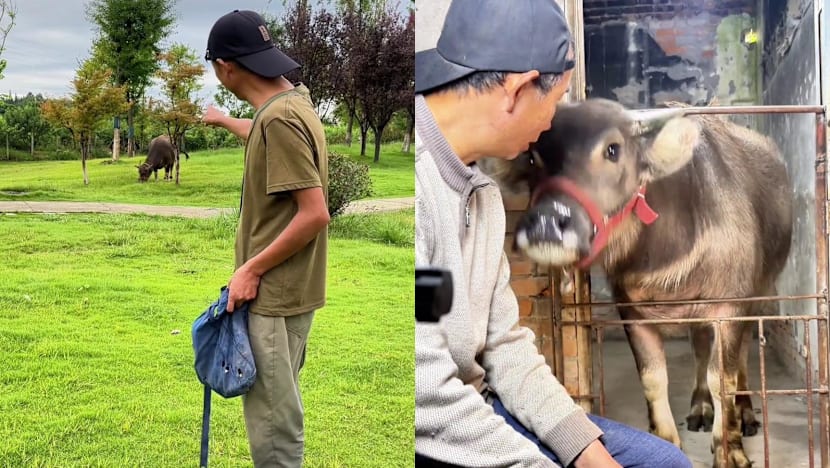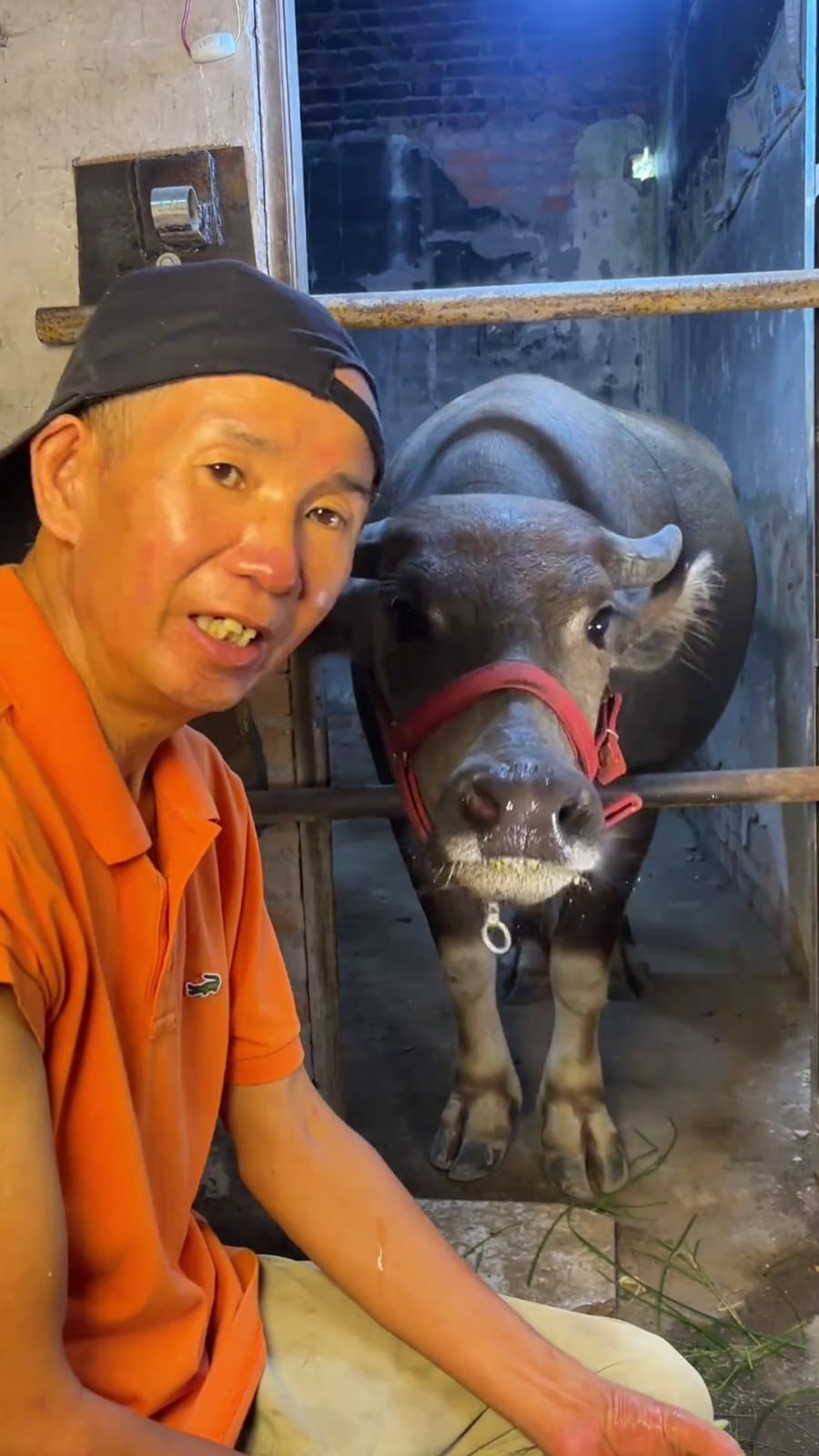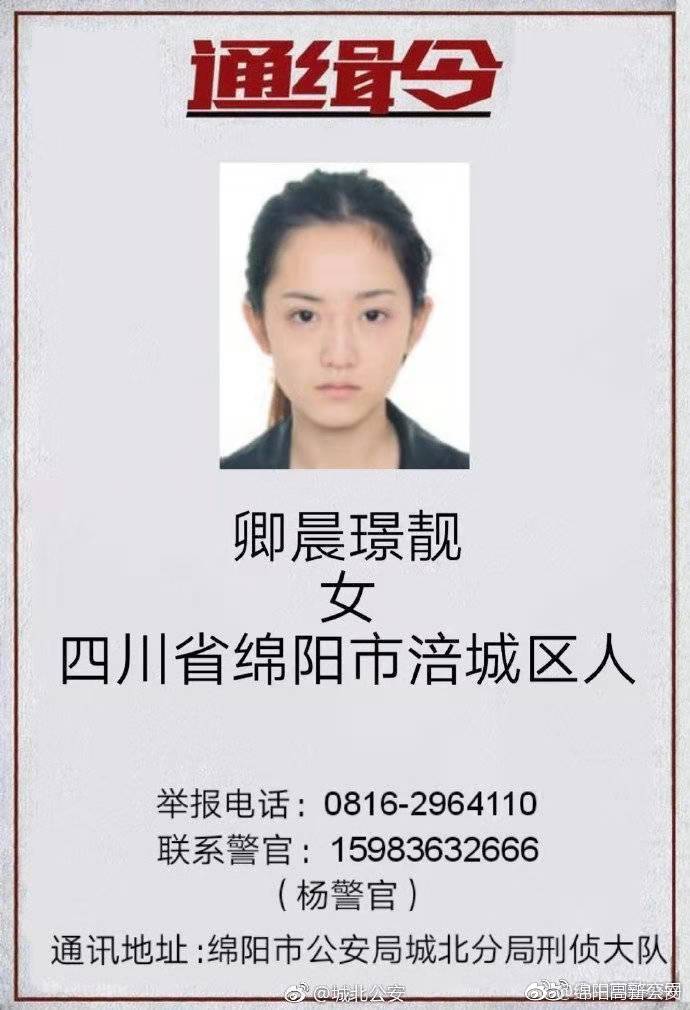Second chances or glorifying crime? Ex-con influencers go viral in China amid controversy
The rise of ex-convict influencers has drawn scrutiny in China, with state media outlets accusing some of “glorifying” crimes to gain clicks.

Luo, who was in jail for fraud and selling fake narcotics, has reinvented himself on Douyin with videos of his post-prison life - raising cattle in the Sichuan countryside. (Images: Douyin/fangniurenyuniu)

This audio is generated by an AI tool.
SINGAPORE: When Xiao first walked out of prison in August, after spending nearly a decade behind bars - he had no money, no job and little idea of how the world outside might have changed.
But the 42-year-old former banker from Liaoning province, who was convicted of embezzlement in 2017, soon found himself on an unlikely path: Becoming a Chinese livestreaming star.
Xiao’s full name was never revealed but he is part of a wave of former inmates who have reinvented themselves online, turning their prison stories into viral content.
Thousands of users on Douyin, the Chinese version of TikTok, joined Xiao’s livestreams where he would discuss and share his experiences in prison.
His presence on the site rose quickly and within days, he had built an audience of more than 37,000 followers before the account was deleted.
“When I (was released), I had nothing to my name,” Xiao said during a livestream session on Aug 26, which marked his 20th day of freedom.
“For eight years, I sat in front of a sewing machine every day,” Xiao said of his daily prison duties.
“Other than eating my meals and going to the toilet, I did not leave my work station once,” he added.
SHARING ONE’S PAST OR “GLORYIFYING” CRIME?
For tricking clients into investing in fake wealth management products worth more than 2.7 billion yuan (US$376 million) during his time at China Minsheng Bank, Xiao was jailed for nine years and fined 90,000 yuan.
His Douyin account has since been shut down, with all posts and past livestreams removed.
On Aug 26, the platform said Xiao’s account had come under official review and was found to have used his prison experience to gain attention - violating its rules.
He was then banned from the site.
There are no explicit rules barring former inmates from using social media or e-commerce platforms but their growing presence has drawn ire - with state media outlets criticising some for “glorifying” their crimes to gain clicks and attention.
In a commentary published on Aug 27, the People’s Daily state newspaper said some former prisoners had been exploiting their criminal pasts as “content” to catch eyeballs, which glorified “illegal behaviour” and exploited curiosity for internet traffic.
Such actions also crossed legal boundaries and undermined public order, it added.
“This may not only cause secondary harm to victims, but it also conveys the wrong message that ‘negative fame is still fame’ to society.”
Still, the report acknowledged that not all ex-convict influencers act with ill intent.
Those who shared their vocational skills or entrepreneurial experiences are “worth advocating”, it said.
But those who turn their criminal history into entertainment or a brand, risk censorship and sanctions.
“True self-reliance and reintegration into society are not achieved by monetising traffic from ‘criminal record marketing’ - but through legal and honest labour,” the commentary said.
Another notable case was that of bicycle thief Zhou Liqi, nicknamed “Qie Guevara”.
The moniker played on both Zhou’s resemblance to Cuban revolutionary leader Che Guevara and the Chinese word “Qie” (to steal), which sounds similar to “Che”.
Zhou shot to fame in 2012 after a police interview in which he bluntly explained he turned to theft because he had “no money”.
When asked why he chose not to work, Zhou replied: “(I) can’t possibly work … I don’t know how to run a business, so I can only sustain myself by stealing.”
Released from prison in 2020, Zhou rejected offers from online agencies eager to sign him as an influencer.
That same year, the China Association of Performing Arts, under the Ministry of Culture and Tourism, announced that any firm attempting to work with him would be blacklisted.
"Companies that ignore the (livestreaming) industry’s moral bottom line and disrupt its healthy ecosystem will be added to a negative list,” the association said.
REDEMPTION OR EXPLOITATION?
Experts point out that the growing popularity of ex-convict influencers falls into a legal and moral grey area.
While some content can be seen as attempts at reintegration, it also raises concerns about ethics and exploitation.
For example, someone with a history of violent crime turning to fashion livestreaming would raise questions and concerns about the potential impact on victims.
“Viewers may question how former criminals have better lives than their victims and the consequences it may have on the victims,” said Cheng Mingming, a professor at Curtin University in Perth.
“These creators might actually be creating (secondhand) harm to the victims.”
The phenomenon of ex-convict influencers, also called “truth tellers” by netizens, is not new in China, where public curiosity about the prison system has existed for years.
“Prison life as a cultural trope is not new (in China),” said Xu Jian, an associate professor specialising in celebrity and influencer culture studies at Deakin University in Victoria, Australia.
From prison ballads in the 1980s to gritty Hong Kong films, stories of life behind bars have always captured public imagination, Xu said, noting that the same fascination today has simply shifted to livestreams and short videos.
“Given the difficulty ex-convicts face in reintegrating into society and finding employment, it is unsurprising that many turn to this career,” Xu said.
“Some begin by branding themselves as ex-convict influencers but once they attract a large following, they often downplay or erase this identity,” he added.
Cheng told CNA that online audiences are often drawn to personal “stories of transformation”.
“They are interested to see how former prisoners have transformed and how they will turn themselves around,” Cheng said.
It’s also about authenticity, he added. “They want to see stories about real people.”
Details about life in Chinese prisons are also largely kept secret, Cheng said, which adds to the appeal of ex-con influencers online who provide glimpses into a “secret world”.
“People (see prison) as “a secret world”, he said. “They want to understand what happened to (ex-convicts) in prison, what made them think differently afterwards and how they will go on with their lives.”
Luo, whose full name has never been revealed, once served time for fraud and selling fake narcotics. These days, he’s swapped cons for cows, reinventing himself on Douyin with videos of his post-prison life - raising cattle in the Sichuan countryside.
His videos, especially those featuring a one-year-old female calf he named Niuniu, continue to draw millions of likes and messages of support from netizens.
“I will not slaughter, sell, or beat my Niuniu. I will accompany her for life,” Luo said in one post.

His account still remains active, with more than 240,000 Douyin followers.
However, comments still come in, asking if Luo still sells “sugar”. He previously used crystal sugar to make fake methamphetamine.
“That happened 10 years ago,” Luo said during a livestream session where he addressed questions about his crimes. “What I am doing now conveys positive energy,” he added.
“A person with a record of misdeeds is not necessarily unkind,” Luo said.
“I beg the public to be merciful and leave me an opportunity to survive.”
Earlier this year in April, a female ex-convict turned livestreamer had her Douyin account banned after she used it to discuss her time in prison.
Qingchen Jingliang first drew attention in 2018 when Chinese authorities released a wanted poster with her mugshot - earning her the nickname “the most beautiful fugitive” among Chinese netizens.
She surrendered to police in November that year and was sentenced to one year and two months in prison for fraud.

But most ex-convict influencers adopt more cautious approaches, said Xu.
“Most are careful not to glorify crime, since they know content is politically sensitive and would not be promoted by platforms.”
“They explicitly encourage viewers to obey the law and learn from their mistakes, framing their stories as positive energy narratives to justify their storytelling,” he added.
Ah Wang, a Douyin user from Fujian province, documents challenges he faces, like finding work after his release. He did not reveal the crime he had committed.
“Reintegrating back into society is tough for us but I won't give up,” he said in a post, noting how he had lost count of countless job rejections.
“I believe that with hard work, a new beginning is possible,” he added.
Another Douyin user, who goes by “24m street”, spent 11 years in jail for assault and was released in 2023.
He talked about the loneliness of starting over after prison. “If I hadn't gone to prison, I would be happy right now,” he said in a video.
“I would be working, dating the person I like, going to places I want to visit and enjoying drinks with friends when I have time … At the very least, I wouldn’t be as lonely as I am now, and there wouldn’t be so many regrets.”
The existence of ex-convict influencers is controversial, said Xu.
“While tighter regulation is inevitable, I do not expect them to disappear entirely.”



















